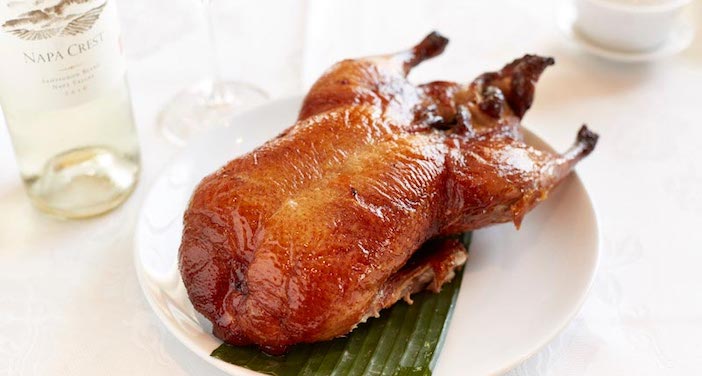
以开放的心态面对正在改变的世界!
要论最早的华人摘星记录,可能要提到一个陌生的名字——Richard Chen(陈辰朗)。
早在2008及2009年,他在美国拉斯维加斯的餐厅永利轩连续摘星米其林,这也是北美首家摘星的中餐厅。
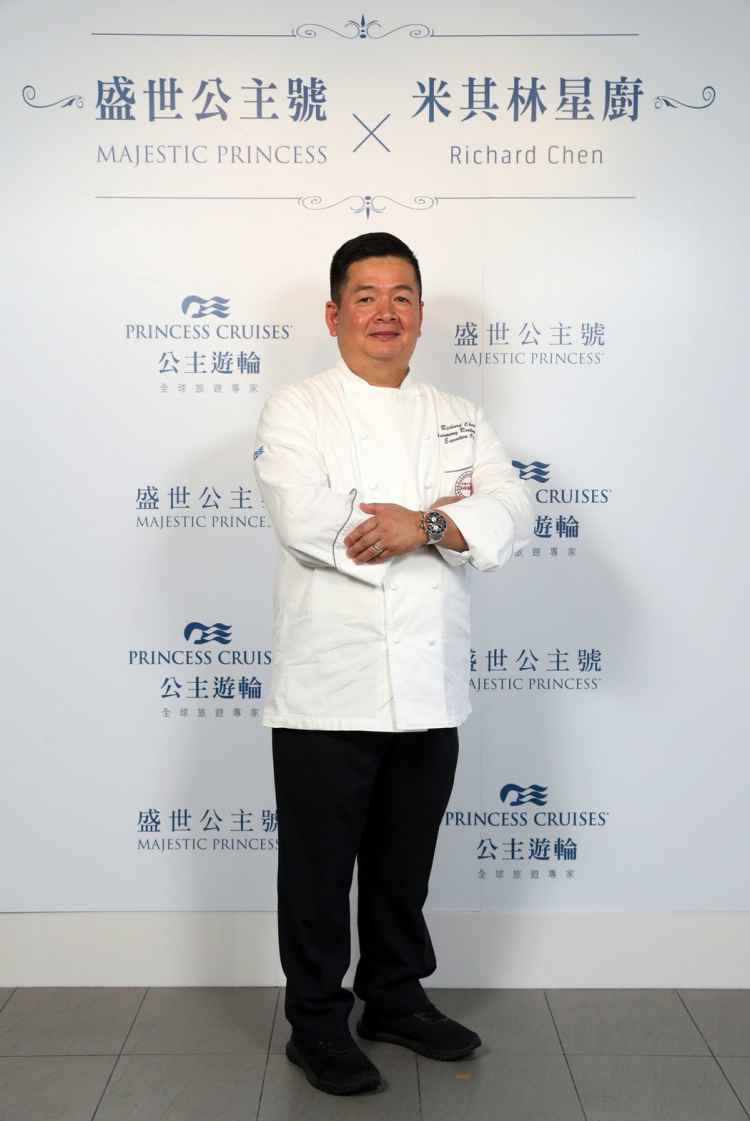
7岁跟着做国宴的老爸混在厨房,12岁搬到了美国,这位已经在厨房呆了近40年的“老师傅”,对中西方餐饮文化有着自己独到见解,无论哪种菜系,他总觉“根源是菜的味道,根基是你的技术”。
而今他也迎接着新的挑战,在盛世公主号上打造中餐厅观澜轩,以无明火的条件创造新粤菜,这其中挑战何在?又如何化解?
Q:Massimo Esposito A:Richard Chen
我的暑假就是在厨房包饺子
Q:最初是怎么会想到去做厨师的?是受到家里的影响吗?
A:我爸爸以前在台湾是位很优秀的主厨,做国宴的,经常为各种来访的领导人做晚宴。小时候,7岁左右就跟在他后面跑,去市场买东西或者工作,我都会跟他一起,然后开始了解厨师做每一道菜的步骤,慢慢有了了解。
等到我12岁的时候,我们搬去了美国。那时我就开始工作了,别人放暑假的时候,我就在厨房里,一周要做80-100个钟头,那时候才12岁而已。但那时候也不觉得辛苦,觉得是一种快乐,因为喜欢嘛。像做锅贴、薄饼、饺子,每个礼拜要做三四千个。那时没有机器揉面团,都是用手的,擀面皮什么的都是用擀面杖擀的。所以我小时候就在餐馆这种环境中耳濡目染(长大的)。
Q:什么时候决定将厨师作为真正的职业,去做一个优秀的主厨?
A:高中的时候,我就知道了这就是我的职业了。可能在餐厅的经历比较多,就感觉我是有天赋的,看东西一看就懂了,这个该怎么去做。不仅是厨房,餐馆的里里外外我都做过,前厅、服务,还是洗碗,我全部都做过。对我来讲,是热情使然。
我父亲是台湾有名的厨师,为重要的官员们做菜,我在这种环境下长大。高中时就有了良好而坚实的中餐基础。后来到了美国,我才开始了解西餐。现在,我了解中餐和西餐,也了解不同的文化背景和烹饪理念。
如果你留意,烹饪就像读一本很长的书,有很多很多章节。但不管情节怎么变化,最终都会回到起点,那就是根源。根源是菜的味道,根基是你的技术。把这两者结合起来,就可以做成一道菜。现在有些厨师们对食物大费周章,玩了很多花样,但往往适得其反。
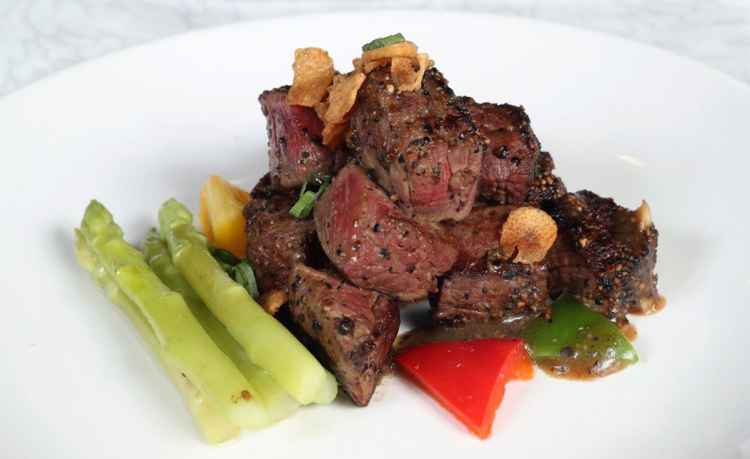
米其林关乎持续性的高品质
Q:您是世界上第一个华人米其林星厨?
A:在北美,是的。十三四岁的时候,我发现从纽约到旧金山,无论哪个州,每家中餐厅都是类似的。你看菜单,你会看到差不多的开胃菜,差不多的汤和差不多一样的主食。
你有餐厅,我就模仿你的菜单,他有餐厅,我就模仿他的菜单。每个人都在“模仿”。当你看烹饪书的时候,你会发现中餐烹饪书中的食谱都差不多,没有什么变化和特点。没有人努力去出版更好的中餐烹饪的书籍。
一些记者问我,你想出一本烹饪书吗?我回答说,希望在我退休之前,用我有关菜品的记忆和知识在出版更精美的烹饪书,把中西菜式的优点结合起来。如果你了解我的菜品,你会知道我尽量让它们干净简单的同时保持中餐的美味。
在温哥华,我遇到了很多上海人,他们对上海口味的小笼包十分挑剔。他们就来自上海,熟悉小笼包的文化和口感。但当他们吃了我做的小笼包后,立马说,这是他们吃过最好吃的小笼包,也算上了他们在上海吃过的。这是我那一天中最骄傲的时刻。
在这些年里,每次我去前厅,总有食客拉着我说谢谢,这是我吃过最好吃的一餐。听到这些话的时候,我就觉得今天我做了我该做的事,并且做的很出色。在我的概念里,没有哪一桌客人是VIP,因为每一桌都是VIP。 我对待每个人都像对待VIP一样,这就是为什么对我来说,高品质和持续性是十分重要的。我一直对所有采访者说,米其林并不是关于什么私密的高级菜谱,米其林是关于高品质和持续性的高品质。
所以,我会经常回想自己的根源,自己的童年味道。这次我回台北之后,第二天一早我就在45分钟之内去了三家餐厅,去吃早饭。吃一口,尝一下,重温记忆中的味道,食物本身的味道。有时候很好吃,你联想到童年的味道。有时候因为餐厅换了食谱或者一些别的原因,食物变得不那么好吃。即便吃到难吃的,我也不会沮丧。我只会告诉我的厨房同事们,一定不要犯同样的错误。
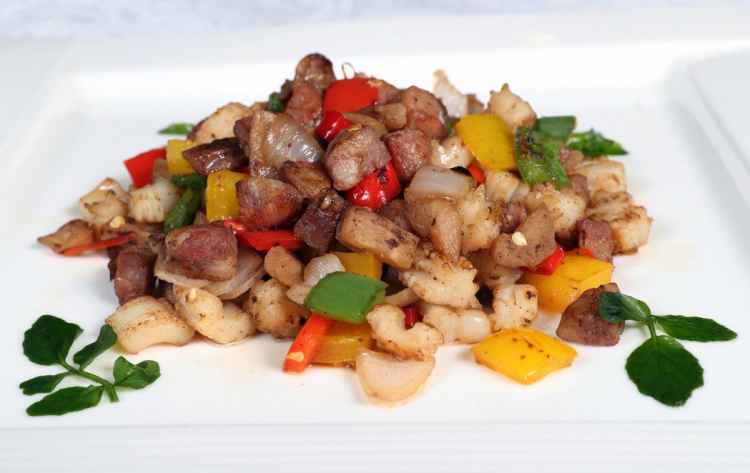
Q:目前你最大的挑战是什么?是为不同的场景设计菜单吗?
A:我觉得是整个菜品和用餐的组合体验。
前段时间我为温哥华一家中餐厅做咨询。餐厅老板喜欢精致的餐厅风格,想要做高端餐饮。但同时他对传统中餐的了解是中餐厅的服务一定要快,出菜必须要非常非常快,因为人们没有太多耐心等待。
这就是有时我喜欢西餐的原因。把食物准备好,在吃之前要用心摆盘。因为视觉效果也是评判这道菜的重要因素,如果这个菜闻起来很香,看上去非常精美,那么我们50%的工作已经完成了。
但是中餐的做法是,我不管,我要马上吃。我感觉很多时候菜品的细节都被忽略了。不要误解我啊,我也是亚洲人。我们用餐的传统就是喜欢迅速。我们不愿意在每道菜之间耐心等待。我们希望一直上菜。那对厨师来说就是很大的挑战了,因为如果你多给我3、5分钟的时间,我可以让菜品更美,看起来更诱人,整个摆盘会更完美。但是改变传统文化和想法是很难的,这就是对厨师的挑战。
他让我思考中餐怎么变美!
Q:你觉得爸爸对你影响最大吗?他肯定为你骄傲吧。
A:我会回答,是也不是。
我认为对我影响最大的人是Charlie Trotter。他是历史上的伟大主厨之一,上个世纪八十年代,他为美国开创了高端餐饮的先河。90年代早期,他在美国有一家当时最好的餐厅。
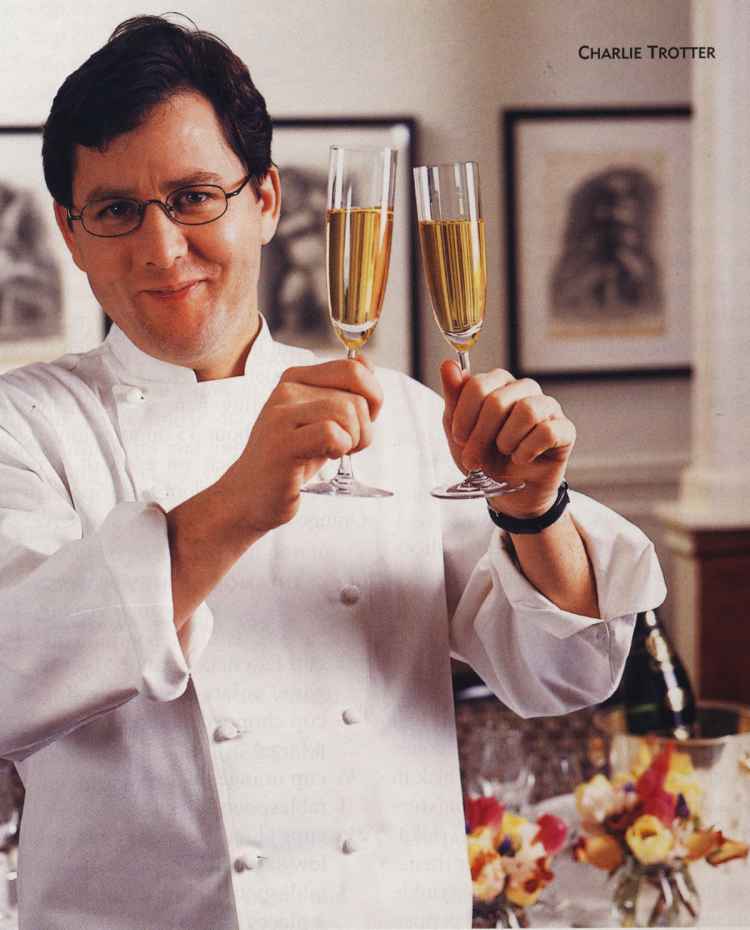
我一直在看他的食谱书,简直快要把书里面带图的页儿吃掉了,哈哈哈。他是我的偶像,受他的影响,那个时候我开始思考亚洲菜可以变得更美,用餐体验可以更精致。
我们那时候刚好都住在芝加哥。我在半岛酒店工作,他成了我的常客。工作之余,他经常来我那儿吃饭,他喜欢吃我做的中式点心。
有一次为了团队培训,我把我的整个团队带了去他的餐厅,那是当时最好的地方,他带给了我们完美的体验,美味的食物和酒水搭配。我们10个人花了大概6000美元。但是,他坚持没有收一分钱,我当时觉得这么做,太不好意思了,所以坚持想要付钱。
但是他说,你能带团队过来,对我们来说很荣幸。
因为他知道我带团队来用餐并不是为了开派对,而是想要教育他们,让他们看到什么是最好的。因为我可以每天24小时一直对他们说你要做什么,也可以变成一个让大家觉得非常挑剔的人,但是那都不“生动”,最好的做法就是带他们亲自去体会,这是最好的学习过程。
那一天,我不用对他们做出任何指示。每个人都很震惊,他们十分留意观察餐厅的细节,食物,服务,每个人都很投入,你可以感受到每个人的投入,并且学到了东西。这之后,这一群人都成为了我餐厅里的明星和功臣。那一年我们的餐厅新开业,在芝加哥餐厅排行榜上排名38,前四十名大多都是法国餐厅。当然对我们来说,仍有很长的路要走。
有一年,我们在榜单仅仅只落后Charlie Trotter一分,那时的我感到十分骄傲。
我跟厨房里的每个人都感同身受,甚至是洗碗工,那样你才能推动他们变得更好。去了解他们工作,更用力地推他们一把,这才是秘诀,这才是团队,要不然你不会前进地。
一定要有开放的思想
Q:你对中国未来厨师有什么话要说吗?我觉得他们很想听的。
A:我会想告诉他们一定要开放的思想。
这一点不仅仅是在食材方面,在菜品方面,在生活中的每一处。你看,世界在改变,新事情每天都在发生。
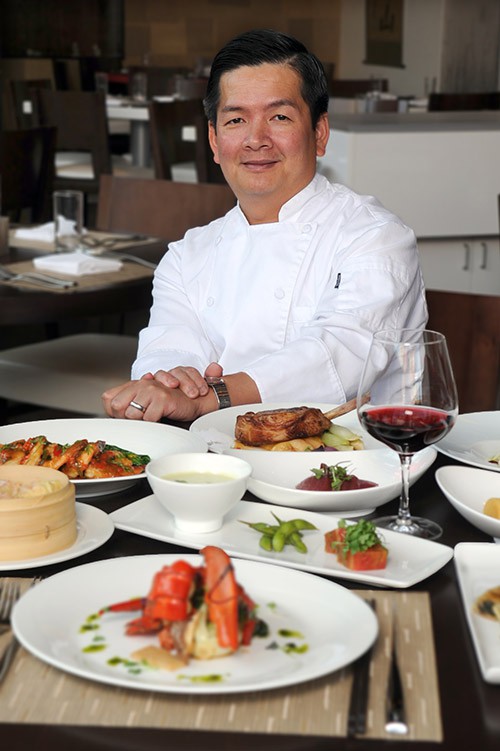
举个例子,我们现在在游轮上有个餐厅,每天在大海上航行,没有陆地,这是以前不能想象的。而这也带来很多变化,比如在游轮上不能有明火。传统意义上讲,中餐烹饪很大的一部分都是关于对火候的把握。但在游轮上只能用电磁炉,不能用明火。我们不能让这些变化影响到工作,不能停下来,这场美食地盛会每天都要持续下去。
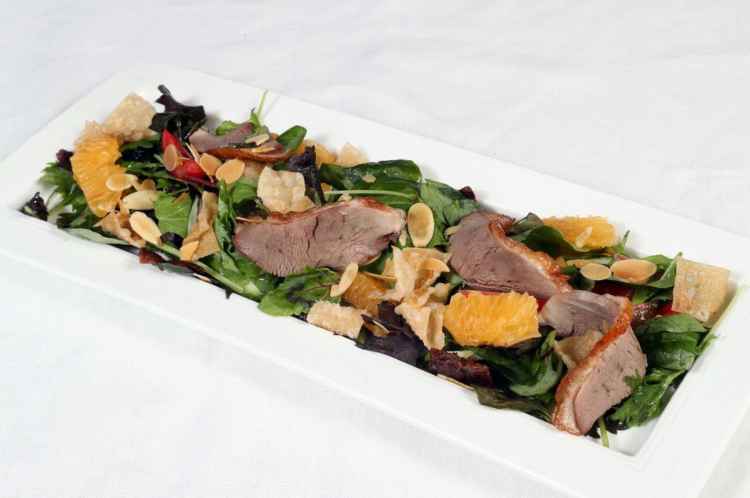
当然我们厨房里有很先进的设施,就算没明火,也依然有足够的温度。如果你有足够的烹饪知识,你就能利用设备来完美地控制温度,这样你依然可以发挥,什么菜式都可以做,还是可以做出美味。
这就是我对新一代厨师的建议:开放一点,开拓眼界并与时俱进,在通向杰出的道路上更加努力。
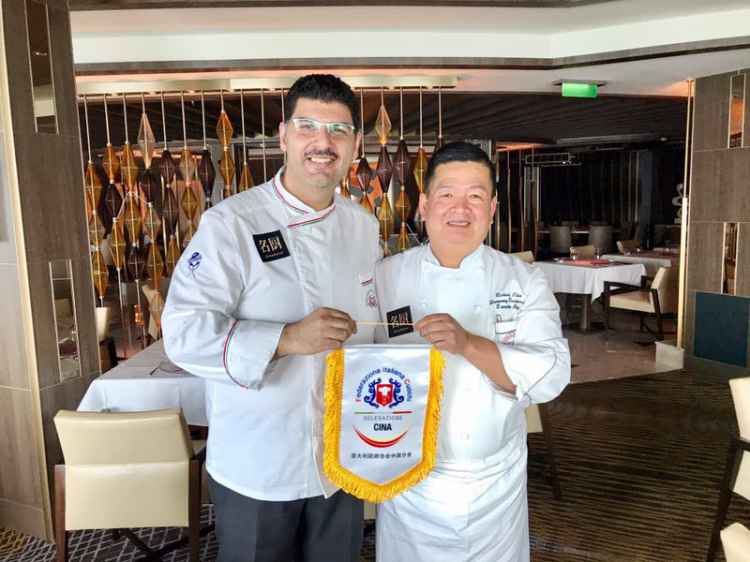
欢迎加入意大利厨师协会中国分会!
方式一:点击图片,填写表格。
方式二:添加名厨米七林微信:mingchuxx7。
附录:英文采访
Q:How did you decide to become a chef? Did your family have any influence on you?
A:My father was an amazing chef in Taiwan, who made banquet for visiting leaders. When I was a child, I would run behind him at about 7 years old and go to the market to buy things. I would be with him, and then I began to know the steps to do every dish.
When I was 12 years old, we moved to the United States. I started working at that time. In summer vacation, I had to do 80-100 hours a week in the kitchen, at that time, I was only 12 years old. But I took it as a pleasure, because I liked it. Like making pot stickers, pancakes and dumplings, we had to make three thousand or four thousand each week. There was no machine kneading dough back then, it was all made by hand and wrapper was made by rolling pin. So when I was little, I was greatly influenced in the restaurant environment.
Q:When did you start to really decide to be a chef?
A:So my father was a high end chef in Taiwan cooking for the governors, I kinda followed his footsteps, I grew up in this kind of environment. When I am the age in the high school, I have already good solid foundation in Asian cooking, so I know where I wanna go, the other side.
Now I know the both side, the eastern and western part. Even if I run out some ingredient, I can go to Emmanuel’s kitchen to pick up anything to make it run.
If you look at it , cooking is like reading many chapter of a book altogether. It keeps changing and changing. At the end, it goes back to the beginning, the root. Today’s interview I said these 2 things, the root or the flavor of the dish. Root is the flavor. And the foundation is the technique. We have this 2 parts putting together. Now you are gonna see a dish right there. I think these days that people trying to play too much with the food. When you play too much, sometimes, it doesn’t work. You get lost.
Q:Chef, you are the first Chinese chef who got the Michelin star outside of China.
A:In north American.Yes.
When I was 13/14 years old, I realized in the US continent, from NY to San Francisco, I don’t care which part or which city of the state, everybody has the same. You are looking at the menu, the appetizer section, the soup section, the main-course section.
You have restaurant, I copy yours. And I try to run with it. Everybody copy from each other.
When you look at the cookbook way, You don’t see that many Chinese cookbook. All the time you see the same book-cook, 10 year, 20 years, the same cookbooks still out there. No one try to make new books and make it to the next level.
Some reporters ask me- do you want to have a new cookbook coming? I say eventually, hopefully by the time I retire, I can put all the memory and make the cookbook to the next level. Combine my knowledge from the Asian cuisine and western cuisine together. If you know my cuisine, I try to be clean and nice.
There is a lot of Shanghainese people I met in Vancouver, they have very picky about the Shanghai style dumpling, you know since that where originally where they come from. All these people, they taste my bun, and they say that’s the best pork bun they ever had, even compare back to Shanghai, that’s one of my proud moment of the day.
All these years, you know when I go to my dining room and guests grab me and say, chef chef I just want to say thank you, this is the best meal of my life, when I heard that I feel like- I’ve done my job today, and done it right. And I don’t treat the table of VIP, I treat everybody like VIP. That’s why for me the consistency is the most important thing. I always tell whoever interview me that, Michelin star is not about secret recipe. It is about maintain your consistency.
So ,when I receive my order, I reflect by my root,my childhood. You know what, that’s why, two days ago, when I arrived to Taipei, the next morning I went to 3 restaurants in 45 minutes, just for breakfast. Take a bite and try it out, I wanna go back to check and refresh my memory of my root, you know, the original flavor of the dish. Sometimes you got it, it taste so good. Sometimes they changed the recipe or did something and it taste not that good. When I got it, it tastes good. Even I eat the bad food, do I get upset about it? No. But I need to tell my guys in my kitchen don’t follow the same thing.
Q: So in your current position, what is your biggest challenge? For food I mean.
A:The biggest challenge in my career?
Q: No, in the cuisine, in the design of your menu for different occasions.
A: I think it is the setting of the dining. For example, I was consulting in a fine dining restaurant in Vancouver, and owner is really into fine dining style but at the same time his traditional understanding of the Chinese food kitchen has to be fast, cook cook cook because people don’t have the patience to wait too much.
That’s why sometimes I admire the western cooking. You get the food ready. And you make the presentation well before you eat it. Because Your eyes will judge the plate before your eat. 50% is there. Wow, I can’t wait to put my mouth. But in traditional Asian way, I feel they can ignore more the touch of the plate and the detail, you know. ….don’t get me wrong, I am Asian myself, but we do prefer to go fast. We don’t give too much patience in between each course. We hope the food keep coming in a roll non-stop.
But that’s kind a big challenge for the chef, because if you give me 3-5 more minutes, I can make the food looks more sexy. And the whole setting experience could be much more perfect. It is difficult to change culture and mentality though. But this is a challenge for chefs. Also it makes it very difficult for wine paring if the dining setting is too fast.
Q: So you would say you farther is the biggest influence in your career? He must be proud of you.
A:I say yes and no. Haha.
I think the person influences me most is probably Charlie Trotter. In the 80’s, he kinda created the cuisine for America. In the 80s and early 90, he had one of the best restaurants in the country. So I was looking at his cook book, and basically I can take any pages with photo and put in my mouth directly. Hah.He is my idol.That’s when I started to imagine the Asian cuisine if can blend in.
Somehow we both live and work in Chicago, I was working in the peninsula hotel and he became one of my regular customers. After work he often come to my restaurant to eat. Once I took my whole team there in his restaurant to try you know, he was the best fine dining place. At the end, 10 people we spent like around 6,000 dollars. He was doing amazing food and also wine pairing. And at the end, he didn’t charge one dollar. I was like no no we got to pay, and he said, no, it is my honor to have your team here. He understand I didn’t bring to my team there to have a party, I was trying to teach them, by letting then to see what is the best. Because I can talk and talk all the time to tell my team you should do this, you should do that, being the most picky person to work with, but at the end of the day, it is better to just show to them what is your expectation exactly.
That day, in his restaurant, I did not have to say a word to my team. Everybody was just observe every single detail there, the food, the service, that day just pop their eyes open, and you can see some of them really got touched and learned. Everyone there was dong a perfect job. That day was the best moment. I just had to show to them what is the best and let’s do this in our own place. Well these guys who were there later become my superstar. That year we made the No.38 top restaurant in Chicago and all the other top 40 are mainly French restaurant. Of course that was still a long way to catch it up.
One year we actually made just one point behind Charlie Trotter. That was my pride. Teaching the guy how to, I mean, we set up the bar together, how we are gonna reach up doing, it is gonna take organization, how we plan the execute. I have been to different shoe of everybody in the kitchen, even the dishwasher, that how you can push them to be better, by knowing their position and push more. This is the secret .This is the team. Otherwise you don’t move forward.
Q: My last question. Chef you are a well-known chef from Asia that represents Chinese culture. Do you have any word to say to the future chefs in China? I think they would like to hear from you.
A: I think they should be open-minded.
Not only about ingredients, about cuisine. You see the world is changing, new things are happening everyday. For example, we have a restaurant now in the middle of the ocean, and we don’t have open fire in the back kitchen. And traditionally speaking, Chinese cooking is all about work and fire. And we only have inductions on the cruise. But this does not stop the operation. You still have to keep the show running.
Now We have amazing facilities, even there is no flame, there is still the heat, that’s the beauty. If you manage the heat well, you could cook everything on it. And you still make amazing food. So that’s my suggestion to the young generation of chefs, be open-minded, try to see more of the world and keep up with the world. And always try harder to be outstanding.
-end-

